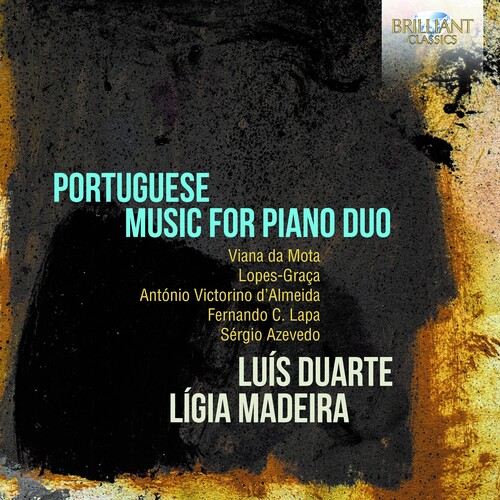Show results for
Deals
- 4K Ultra HD Sale
- 50s Films Sale
- Action Sale
- Alternative Rock Sale
- Anime sale
- Award Winners Sale
- Bear Family Sale
- Blu ray Sale
- Blues on Sale
- British Sale
- Christmas in July
- Classical Music Sale
- Comedy Music Sale
- Comedy Sale
- Country Sale
- Criterion Sale
- Drama Sale
- Electronic Music sale
- Folk Music Sale
- Horror Sci fi Sale
- Kids and Family Sale
- Metal Sale
- Music Video Sale
- Musicals on Sale
- Mystery Sale
- Naxos Label Sale
- Page to Screen Sale
- Paramount Sale
- Rap and Hip Hop Sale
- Reggae Sale
- Rock
- Rock and Pop Sale
- Rock Legends
- Soul Music Sale
- TV Sale
- Vinyl on Sale
- War Films and Westerns on Sale

Portuguese Music for Piano Duo
- Format: CD
- Release Date: 1/22/2021

Product Notes
This precious collection of piano-four-hands works from the foremost musical minds of Portugal in the 20th and 21st centuries can serve as a welcome introduction to the classical music of Portugal for those who may not know it. But there is a greater significance and added value to this thoughtful recital programme, in that it traces back the genealogy of modern Portuguese classical composition - and pianism! - to roots firmly planted in German Romantic soil. It links the living composers to their teacher and inspiration, the great composer-ethnographer Fernando Lopes-Graça who undertook research into Portuguese folk music on a par with what Vaughan Williams and Bartók & Kodály did in their own nations, and then links Lopes-Graça back to his piano professor, the great virtuoso and music educator José Viana da Mota, himself a pupil and disciple of Liszt. The album opens fittingly with a set of Portuguese Folk Melody treatments by Lopes-Graça, the third in his three-volume set being dedicated exclusively to piano four hands. Immediately, the national colour welcomes listeners to the distinct ethnicity of Europe's far southwestern corner, a historic and pre-historic crossroads for Celtic, Roman, Gothic and Moorish cultures. This is followed by the Sonatina of his student, Sérgio Azevedo, bristling with the Neoclassicism he inherited from Lopes-Grac¸a. Then to the wellspring, Viana da Mota's Opus 7 singing with a Mendelssohnian lyricism, yet nonetheless tinged with the innate longing of the Portuguese soul. The expressionistic, effusive atonality of Lapa's Storyboard returns the listener to the modern era, and to finish, Victorino d'Almeida's heartfelt Ballad (for a child about to be born) embraces melody and tonality once again, from a post-modern vantagepoint.


